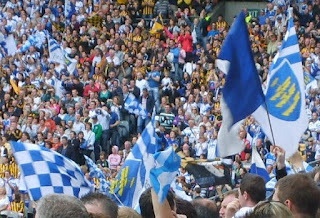Con Houlihan: An Irish sportswriter on apostrophes and hurling
 "A man who can put an apostrophe in the wrong place is capable of anything," said the Irish sportswriter Con Houlihan, who died Saturday.
"A man who can put an apostrophe in the wrong place is capable of anything," said the Irish sportswriter Con Houlihan, who died Saturday.While experience has taught me that reporters who don't know where to put apostrophes (and adjectives, adverbs, nouns, verbs, prepositions, em-dashes, commas, semi-colons, numbers, letters, words, paragraphs, their own names) are, indeed, capable of much, including advancement to positions where they can pass on their lack of knowledge to other reporters, it's Houlihan's sports writing that is the occasion of this post.
 |
| (Photo by your humble blogkeeper) |
I wrote after the game that a friend had made the day's winners sound like "the Ballets Russes, Patton's Third Army and the 1927 New York Yankees rolled into one." Houlihan had written years earlier that
"We tend to take this remarkable game too much for granted: a fresh eye would more sharply perceive its blend of bravery and hardihood and delicate skills."Knowing hurling's association with violence (the club-like hurleys have been used for purposes other than carrying and striking the sliothar, or ball), I was astonished and gratified to see supporters of the two teams, Kilkenny and Waterford, mingling and drinking in peace and good fellowship before and after the game. Houlihan wrote about another All-Ireland final that
"The early swallows from Cork and Wexford were in town – mostly lads and lasses who fraternised freely in an intermingling of red and white and purple and gold and whose thoughts were more on love than on war."Houlihan's appreciation of the game showed, too, in his description of on-field action, a skill sadly atrophied now that sportswriters are taught to leave that sort of thing to television:
"Tony Doran put up his hand in a thicket of ash, brought down the ball, and with a full swing of the hurley sent it to the net."A word is worth a thousand pictures.
© Peter Rozovsky 2012
Labels: Con Houlihan, Croke Park, Dublin, hurling, Ireland, sports

0 Comments:
Post a Comment
<< Home